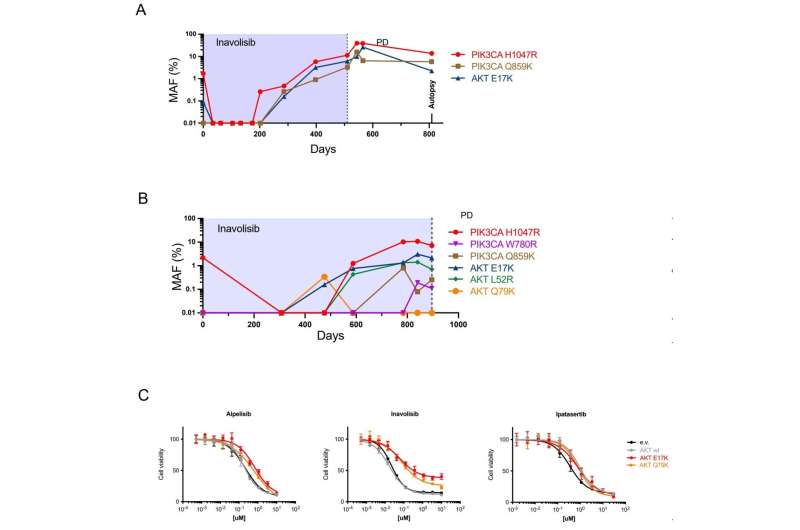This article has been reviewed according to Science X's editorial process and policies. Editors have highlighted the following attributes while ensuring the content's credibility:
fact-checked
peer-reviewed publication
trusted source
proofread
Researchers identify the mutations that drive resistance to PI3K inhibitors in breast cancer, find they can be overcome

Mutations in the PIK3CA gene that lead to elevated production of the PI3Ka protein are among the most frequent alterations found in cancer, including in approximately 40% of hormone receptor–positive breast cancers.
Alpelisib, the first drug targeting PI3Ka, was approved for use in the United States four years ago, but cancers with mutated PIK3CA eventually develop resistance to the medication.
A team led by investigators at the Mass General Cancer Center, a member of the Mass General Brigham health care system, recently identified that resistance in some cases can be caused by secondary mutations in the PIK3CA gene itself. This leads to reduced drug binding and in turn, shows how a new class of PI3Ka inhibitors, which bind to a different part of the target, might still be effective in these cases.
In the study, which is published in Cancer Discovery, investigators collected blood and/or tumor samples from 39 patients with advanced breast cancer that developed resistance to alpelisib or inavolisib (another PI3Kα inhibitor).
The team analyzed circulating tumor DNA isolated from blood to identify newly acquired genetic mutations arising in the patients' tumors over the course of treatment. The team also sequenced the DNA of 100 tissue specimens collected from autopsies of eight patients with metastatic breast cancer who had previously given their consent.
Next, the investigators tested the effects of the acquired mutations that were found in patients in tumor cell line models.
"We were able to confirm that some of these alterations are indeed responsible for limiting the effectiveness of PI3Kα inhibitors," says co–lead author Ferran Fece de la Cruz, Ph.D., a postdoctoral fellow in the Mass General Cancer Center.
"We observed that 50% of patients acquire genomic alterations within the PI3K pathway that led to reactivation of the signaling pathway—including mutations that impact not only PI3Ka but also other pathway components, such as PTEN and AKT."
Some of the acquired mutations affecting PI3Ka were found to alter the structure of the region where alpelisib or inavolisib bind, explaining why patients with these specific mutations no longer benefited from the drugs (like changing a lock so that the key no longer fits).
Importantly, the researchers found that a different class of PI3Kα inhibitors—known as allosteric pan-mutant-selective inhibitors—that bind to a different region of the mutant protein were still effective even in the presence of these acquired mutations.
"These findings suggest that this new class of PI3Kα inhibitors could represent an important therapeutic option for these patients," notes co-lead author Andreas Varkaris, MD, Ph.D., a clinical investigator in the Termeer Center for Targeted Therapy at the Mass General Cancer Center.
Co–senior author Dejan Juric, MD, who is the Director of the Termeer Center for Targeted Therapies & Investigational Cancer Therapeutics Program at the Mass General Cancer Center, stresses the importance of additional research to guide clinical care.
"As more and more patients are treated with PI3Kα inhibitors, we are studying how frequent each of these acquired genomic alterations are," Juric says. "Moreover, a significant portion of our patients do not present any of these mutations at the time of disease progression, indicating that the puzzle is far from being completed."
Ryan Corcoran, MD, Ph.D., who is the Scientific Director of the Termeer Center for Targeted Therapy and the Director of the Gastrointestinal Cancer Center at MGH, is also a co–senior author on the study.
More information: Andreas Varkaris et al, Allosteric PI3K-alpha inhibition overcomes on-target resistance to orthosteric inhibitors mediated by secondary PIK3CA mutations, Cancer Discovery (2023). DOI: 10.1158/2159-8290.CD-23-0704


















